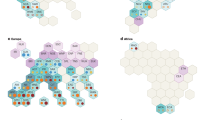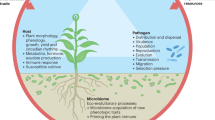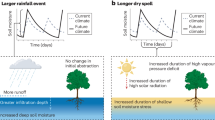Abstract
DROUGHT severely decreases grain yield in many cereal growing regions and the resulting fluctuations in world food supply have serious repercussions1. Crop breeders and physiologists are therefore studying varietal characteristics that may enable cereals to yield more consistently in drought conditions2. Very few precise field measurements show how drought affects grain growth, but procedures have been advocated to provide a more precise description of grain growth and a more rigorous examination of sources of assimilate used for grain growth3–5. We have used these procedures to analyse how the droughts of 1975 and 1976 affected grain growth of wheat crops in England and to define particular physiological traits which govern yield.
This is a preview of subscription content, access via your institution
Access options
Subscribe to this journal
Receive 51 print issues and online access
$199.00 per year
only $3.90 per issue
Buy this article
- Purchase on Springer Link
- Instant access to full article PDF
Prices may be subject to local taxes which are calculated during checkout
Similar content being viewed by others
References
Agrometeorology of the Wheat Crop, Symp. No. 369 (World Meteorological Organisation, Geneva, 1974).
Stone, J. F. (ed.), Plant Modification for more Efficient Water Use, Agric. Meteorol., Special Issue (1974).
Gallagher, J. N., Biscoe, P. V., and Scott, R. K., J. appl. Ecol., 13, 563–583 (1976).
Riggs, T. R., and Gothard, P. G., J. agric. Sci., 86, 603–608 (1976).
Gallagher, J. N., Biscoe, P. V., and Scott, R. K., J. appl. Ecol., 12, 319–336 (1975).
McGowan, M., in Proc. Symp. Isotope and Radiation Techniques in Soil Physics Studies, 435–445, (International Atomic Energy Agency, Vienna, 1974).
Smith, L. P., Potential Transpiration, Tech. Bull. Minist. Agric. Fish. Fd., 16 (Her Majesty's Stationery Office, London, 1967).
Duncan, W. G., in Crop Physiology (edit. by Evans, L. T.), 23–50 (Cambridge University Press, London, 1975).
Sofield, D. I., Evans, L. T., and Wardlaw, I. F., Bull. R. Soc. N.Z. 2., 12, 909–915 (1974).
Pushman, F. M., and Bingham, J., J. agric. Sci, 85, 559–563 (1975).
Thorne, G. N., in The Growth of Cereals and Grasses (edit. by Milthorpe. F. L., and Ivins, J. D.), 88–105 (Butterworths, London, 1966).
Wardlaw, I. F., Aust. J. biol. Sci., 22, 1–16 (1967).
Jenner, C. F., and Rathjen, A. J., Aust. J. Pl. Physiol., 2, 311–322 (1975).
Asana, R. D., and Williams, F. R., Aust. J. agric. Res., 16, 1–13 (1974).
Spiertz, J. H. J., Neth. J. agric. Sci., 22, 207–220 (1974).
Asana, R. D., and Saini, A. D., Physiol. Pl., 11, 666–674 (1958).
Author information
Authors and Affiliations
Rights and permissions
About this article
Cite this article
GALLAGHER, J., BISCOE, P. & HUNTER, B. Effects of drought on grain growth. Nature 264, 541–542 (1976). https://doi.org/10.1038/264541a0
Received:
Accepted:
Published:
Issue Date:
DOI: https://doi.org/10.1038/264541a0
This article is cited by
-
Wheat glutamine synthetase TaGSr-4B is a candidate gene for a QTL of thousand grain weight on chromosome 4B
Theoretical and Applied Genetics (2022)
-
Genetic variation in drought tolerance at seedling stage and grain yield in low rainfall environments in wheat (Triticum aestivum L.)
Euphytica (2018)
-
Cloning of TaSST genes associated with water soluble carbohydrate content in bread wheat stems and development of a functional marker
Theoretical and Applied Genetics (2016)
-
Crop architecture and crop tolerance to fungal diseases and insect herbivory. Mechanisms to limit crop losses
European Journal of Plant Pathology (2013)
-
The response of mulberry trees after seedling hardening to summer drought in the hydro-fluctuation belt of Three Gorges Reservoir Areas
Environmental Science and Pollution Research (2013)
Comments
By submitting a comment you agree to abide by our Terms and Community Guidelines. If you find something abusive or that does not comply with our terms or guidelines please flag it as inappropriate.



